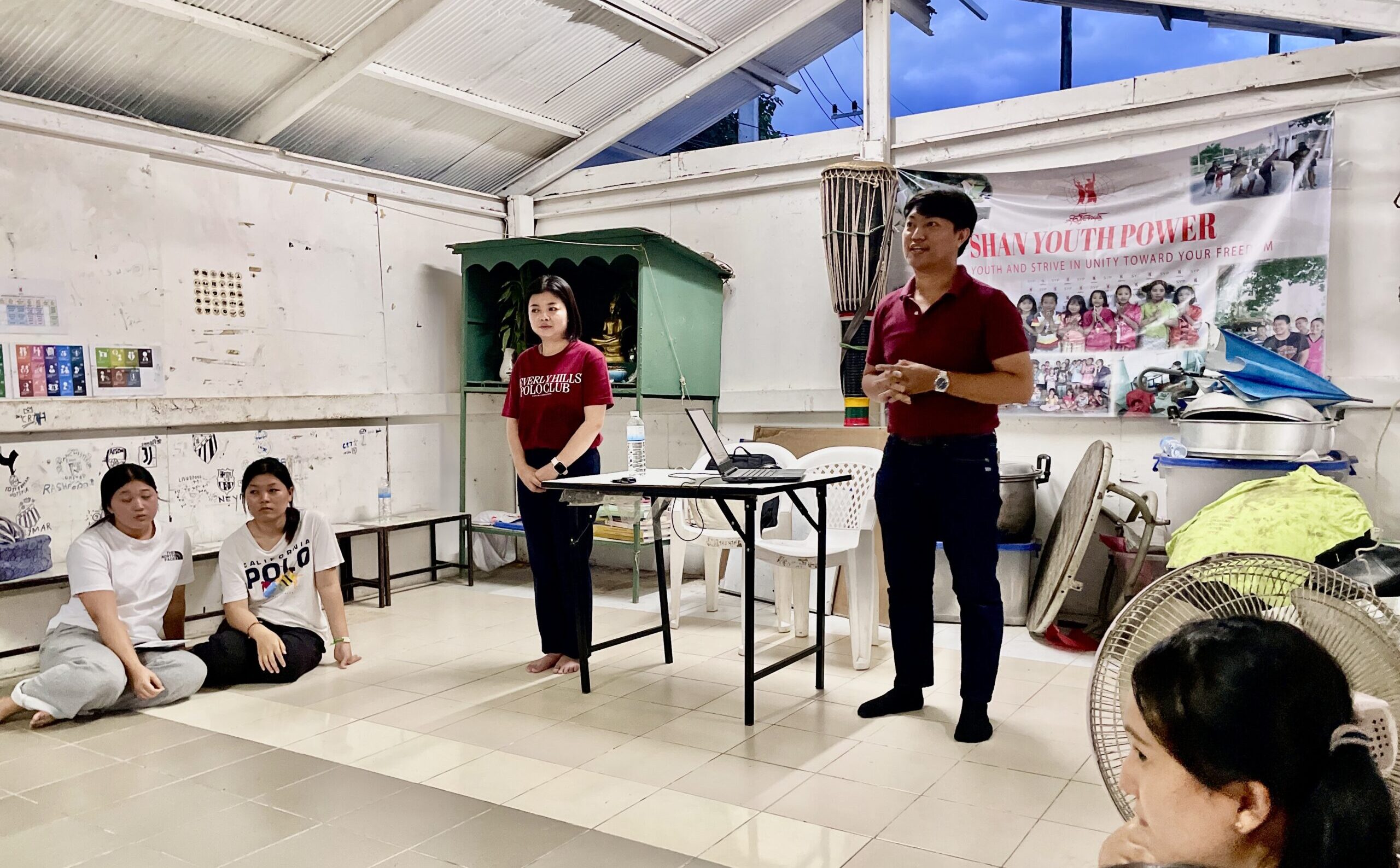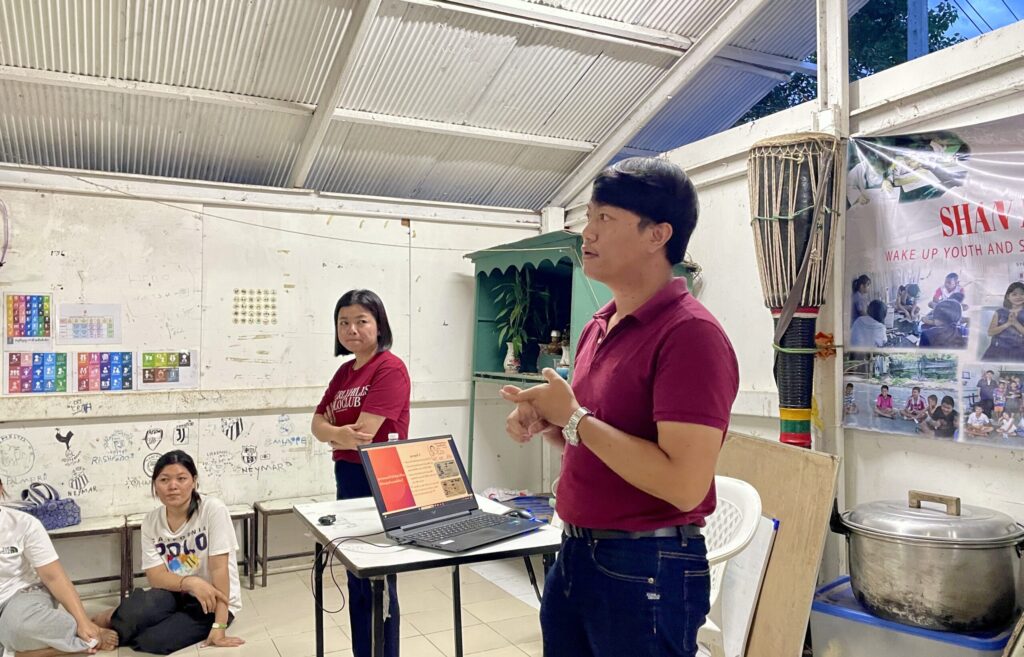On May 18 and 31, 2025, Kwah Dao, in collaboration with Shan Youth Power, successfully held two legal awareness workshops aimed at improving legal understanding among migrant workers and their children in San Sai and Doi Saket districts, Chiang Mai Province. Kwah Dao contributed by preparing the training content and sending its attorney to deliver lectures on two key topics:
- Healthcare rights under the Social Security Fund, the Health Insurance Fund for Persons with Legal Status Issues, and the Migrant Health Insurance Scheme, and
- Children’s rights relating to healthcare, travel, education, and the possibility of acquiring Thai nationality.
Around 50 individuals attended the two workshops combined. Shan Youth Power took responsibility for organizing the venues, handling participant registration, and covering all associated costs. Kwah Dao focused on content development and legal instruction. The workshops were designed to equip migrant workers and their children with essential knowledge of the rights they are legally entitled to and to promote equal and accessible use of those rights.

Workshop 1: Understanding Healthcare Rights Under Three Public Health Schemes
The first workshop, titled “Healthcare Rights under the Social Security Fund, the Health Insurance Fund for Persons with Legal Status Issues, and the Migrant Health Insurance Scheme”, was held at a village community center in San Sai District—an area with a significant migrant worker population.
The session focused on clarifying the differences between the three public healthcare schemes, identifying who is eligible under each, and explaining the conditions for accessing benefits. These differences depend largely on the type of identification documents held by migrant workers. Participants gained a clearer understanding of how the type of ID card they possess affects their healthcare rights and why having proper health coverage is crucial in times of illness.
Most participants held either Myanmar passports or Certificates of Identity issued by the Myanmar government. These documents generally make them eligible for coverage under the Migrant Health Insurance Scheme. Under this scheme, workers and their dependents must purchase health insurance, with premiums typically ranging from several hundred to a few thousand baht, and coverage periods lasting from six months to three years, depending on the chosen plan.
One issue that surfaced during the Q&A session involved the employment practices of some well-known real estate companies. These companies avoid directly hiring migrant workers to sidestep legal obligations such as enrolling workers in the Social Security system and making employer contributions. Instead, they employ workers through nominee employers—third-party individuals or companies who serve as the formal employer on paper. This practice deprives workers of the more comprehensive benefits offered under the Social Security Fund, such as unemployment compensation, maternity leave, child support, and death benefits—all of which are not included in the Migrant Health Insurance Scheme.
Some migrant workers, particularly those holding cards issued to persons without civil registration status (stateless individuals), are in a comparatively better position. They are entitled to basic healthcare benefits similar to Thai nationals under the Health Insurance Fund for Persons with Legal Status Issues, without the need to purchase coverage. This is possible because the Thai government allocates an annual budget for this fund.
 Workshop 2: Rights of Migrant Children in Health, Mobility, Education, and Thai Nationality
Workshop 2: Rights of Migrant Children in Health, Mobility, Education, and Thai Nationality
The second workshop, titled “Rights Related to Healthcare, Travel, Education, and Thai Citizenship for Children of Migrant Workers”, was held at a construction workers’ camp—one of four camps where Shan Youth Power runs after-school classes for migrant children.
This session focused on educating parents about the differences in rights between children who were born in Thailand and those who were not, and how those differences are affected by the legal status of the parents. For instance:
- Children of parents holding Myanmar passports or Certificates of Identity, whether born in Thailand or not, are only eligible for healthcare coverage if enrolled in a dependent health insurance plan.
- Children of parents holding Highlander Cards or Stateless Cards, regardless of birthplace, are eligible for basic healthcare under the Health Insurance Fund for Persons with Legal Status Issues—a benefit similar to that available to Thai children.
The session also explained the varying conditions under which children can apply for Thai nationality:
- Children of the first group (passport/COI holders) born in Thailand are only eligible to apply for Thai citizenship after completing a university degree—unless they meet one of six exemption criteria. These exemptions include cases such as being adopted and cared for by a Thai citizen for at least five years, or being selected to represent Thailand in international academic or athletic competitions and bringing recognition to the country.
- Children of the second group (stateless card holders) born in Thailand have a more favorable pathway and may apply for Thai citizenship immediately, without the need to complete a university degree.
 Legal Consultation and Individual Support
Legal Consultation and Individual Support
Following each workshop, participants had the opportunity to speak privately with the attorney for one-on-one legal consultations. During these sessions, the attorney reviewed each individual’s situation and available documents before offering tailored legal advice.
Most questions related to civil registration and nationality issues affecting both parents and their children. Some participants lacked required documents or witnesses, while others faced delays or rejections during the application process due to bureaucratic obstacles. The attorney from Kwah Dao provided practical, case-by-case guidance to help each individual move forward with the appropriate legal steps.


